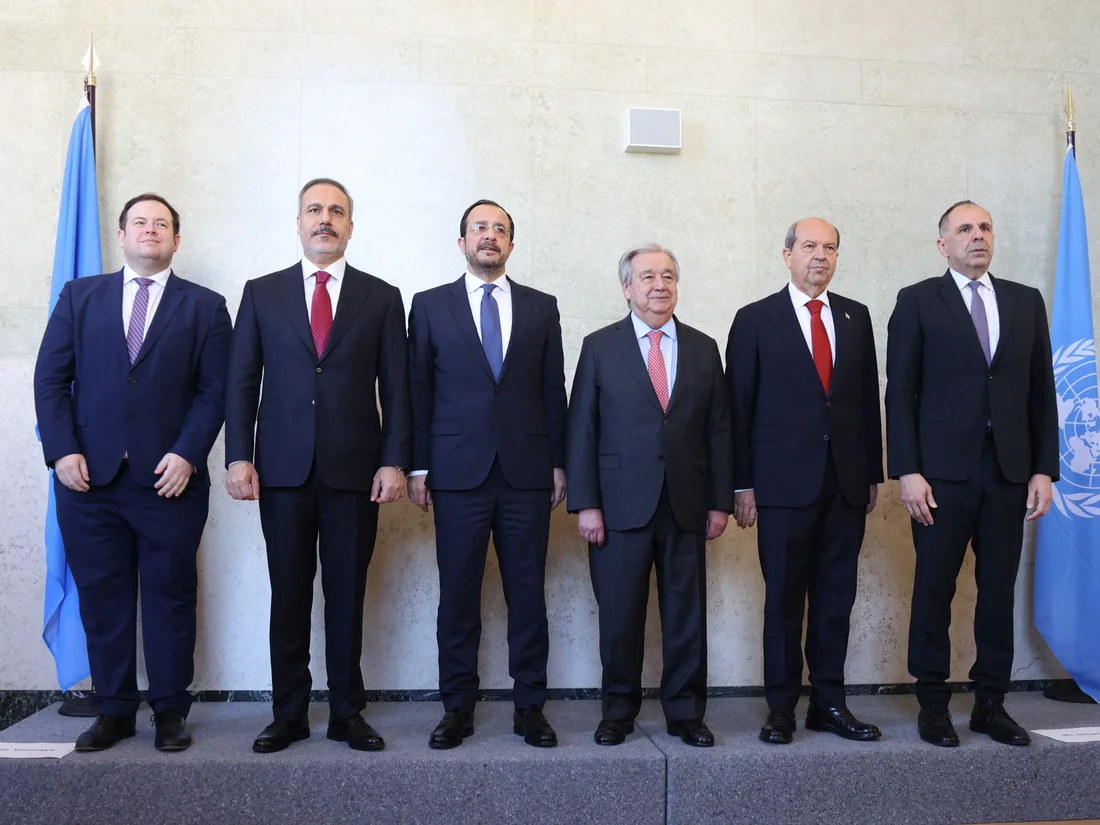By Andreas Theophanous
On March 17-18, the UN Secretary-General Antonio Guterres chaired another five-party conference in Geneva on the Cyprus problem. President Nicos Christodoulides, the Turkish Cypriot leader Ersin Tatar, the foreign ministers of Greece and Turkey, Giorgos Gerapetritis and Hakan Fidan respectively, and the British Minister of State for European Affairs Stephen Doughty participated.
The Head of the Cyprus Settlement Support Unit of the European Commission, Julia Bertezzolo, was in Geneva but did not participate in the meetings even as an observer.
Yes, the President of the European Council Antonio Costa and the President of the European Commission Ursula von der Leyen sent letters to the UN Secretary-General, endorsing his efforts and encouraging further progress, but it would have been better if the EU was represented in the meetings.
It is a positive development that there was no deadlock given that there is no common ground for the resumption of the talks. At the same time, it is a mistake to cultivate high expectations.
The UN Secretary-General announced his intention to promote some confidence building measures (CBMs), to appoint a personal envoy and to have another similar meeting at the end of July 2025.
This was an attempt to keep the process alive. Undeniably, these decisions have been influenced by developments in other issues such as the Euro-Turkish relations.
Given the insistence of the Turkish side on a two-state solution I consider it imperative for the Greek Cypriot side to revisit its position.
More specifically, the Greek Cypriot side could submit some fundamental guidelines for the revision of the 1960 Constitution with the objective to achieve a normal federal state, as well as a series of suggestions for additional CBMs and cooperation measures between the two communities. These could be pursued where necessary with the involvement of the guarantor powers, the EU and the US.
In addition, both the Republic of Cyprus and the EU could raise the issue of the implementation of the Ankara Protocol by Turkey so as to include this island-state as well. After all, this is a long-standing obligation of Ankara.
If this is implemented there will be serious positive developments including more trade and exchanges for all parties involved. It is alsoessential to stress that such an approach will be part of an evolutionary approach toward a comprehensive settlement eventually.
I consider the suggested approach as superior to the policy that has been pursued so far and has essentially failed. If the negotiations were to start in the next few months with the established positions of the two sides, the expected outcome would be an offer for a confederation or a new deadlock.
Any mediator would arrive at this outcome – with the Greek Cypriot position being to resume the negotiations at the point where they stopped in July 2017 and the Turkish side insisting on a two-state solution. Confederation would be the midpoint between the position of the two sides.
Undoubtedly, the policy pursued by the Greek Cypriot side in the last 50 years has not led to the expected outcomes. In addition, the negotiations’ framework has shifted toward the positions of the Turkish side.
I understand that to a great extent this has been the outcome of the great imbalance of power. Nevertheless, there have also been serious mistakes by the Greek Cypriot side.
It is not enough to reject ideas and suggestions submitted by third parties that may not be to its interest. It is also important to submit specific proposals within the framework of a federal arrangement. That presupposes political will, clarity of direction as well as a deep understanding of federalism. It is also necessary to have a convincing narrative at the political level.
Furthermore, it is essential to understand that, methodologically, an evolutionary approach is the only realistic option. Even in the case in which there is a comprehensive agreement, it is impossible to move on from one day to another.
There are different narratives and historical perspectives while the two sides are divided by a heavy historical record and blood. That is why an evolutionary approach is imperative.
Last but not least, while working toward a settlement it is important to understand that it has to be functional and viable. This cannot be taken for granted.
A federal Cyprus would require the support and the loyalty of both Greek Cypriots and Turkish Cypriots as well as the respect of external powers. And it is necessary to have security, an efficient system of governance, as well as an economy which will lead to an improved standard of living and socioeconomic development.
Professor Andreas Theophanous is the President of the Cyprus Centre for European and International Affairs






Click here to change your cookie preferences